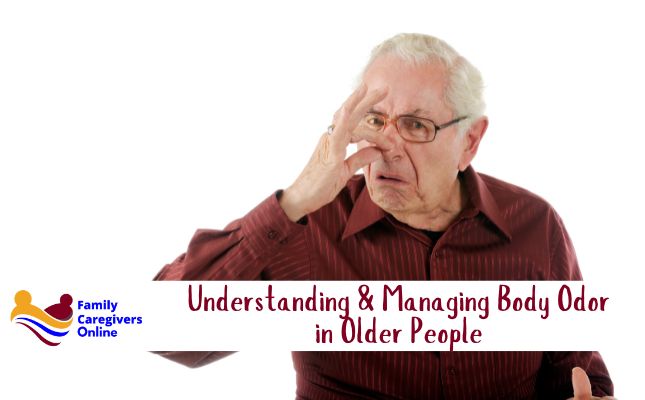


Imagine a rotten apple. Its distinct odor comes from the breakdown of sugars and organic compounds, often triggered by bacteria and fungi. In a similar way, the so-called “old man smell” is linked to a natural increase in a compound called 2-nonenal, which becomes more prominent with age. This is normal and part of how our bodies change over time.
2-nonenal is produced when skin lipids (fatty acids) break down, especially with the help of bacteria on our skin. This is more likely to occur when we sweat frequently or don’t bathe regularly. Like the microorganisms in a spoiled apple, skin bacteria generate 2-nonenal as a byproduct—leading to a greasy, grassy, or waxy smell. This odor can be more noticeable in enclosed spaces like nursing homes and can persist without proper skin and environmental care.
Healthy daily routines and awareness include identifying and treating medical issues, a well balanced diet, regular bathing with antibacterial soap, using deodorants or antiperspirants nail trims, dental hygiene, and wearing breathable clothing are among the basic ways to manage and reduce odors.
Key Strategies for Reducing Age-Related Body Odor
Daily Hygiene
-
Bathing: Shower or bathe daily—especially after sweating.
-
Focus Areas: Clean underarms, groin, feet, and skin folds thoroughly.
-
Drying: Dry these areas completely to prevent bacterial growth.
-
Products: Use antibacterial soap and consider a gentle exfoliating scrub.
-
Shaving: Shaving underarms can help sweat evaporate more easily.
Clothing Choices
-
Natural Fibers: Wear breathable fabrics like cotton, wool, and silk.
-
Moisture-Wicking Fabrics: Use for exercise or hot weather.
-
Clean Clothes: Change clothes daily and after sweating; wash them regularly.
Deodorants & Antiperspirants
Deodorants: Help reduce odor by targeting bacteria.
Diet Adjustments
-
Limit Certain Foods: Reduce intake of onions, garlic, and heavily spiced foods.
-
Hydration: Drink plenty of water to flush out odor-causing compounds.
-
Supplements: Green tea and Japanese persimmon extract may help neutralize body odor.
Foot Care
-
Socks: Use moisture-wicking or cotton socks.
-
Hygiene: Wash feet daily and keep them dry.
-
Odor Control: Try foot powders or deodorizing insoles; replace them regularly.
Addressing Medical Conditions
-
Routine Check-Ups: Manage health conditions that may affect body odor.
-
Medication Review: Some medications can alter body chemistry—ask your doctor if these might be contributing.
Natural Remedies
-
Baking Soda: Neutralizes odors—apply to underarms or feet.
-
Apple Cider Vinegar: Can help kill bacteria when used on affected areas.
-
Hydrogen Peroxide: A diluted solution can be applied to destroy bacteria (WebMD suggests one part peroxide to several parts water).
Other Considerations
-
Oral Hygiene: Maintain good oral care to reduce overall body odor.
-
Stress Management: Stress can increase sweating; use relaxation techniques.
-
Cooling Strategies: Stay cool to prevent excessive sweating.
-
Exfoliation: Use a salt or sugar scrub to remove excess oils and dead skin.
-
Environment: Keep living areas well-ventilated to reduce lingering smells.
These strategies aren’t just about hygiene—they’re about dignity, comfort, and helping older adults maintain independence and confidence. Body odor is manageable, and often a sign of something that can be addressed with practical care, awareness, and kindness.
Remember, check with physicians and other health care providers before making drastic changes in your food and natural remedies.
By Zanda Hilger, LPC, Founder, Family Caregiver & Program Manager for Family Caregivers Online
Sources: Harvard Health, HHS US Health and Human Services, Northwestern Medicine, WebMD
We hope this information is helpful to you in the important work you do as a family caregiver.
For more resources, subscribe to our free newsletter!








